#creative responsibility
Explore tagged Tumblr posts
Text
Katy Perry Faces Legal Issue regarding "Lifetime" Clip
Katy Perry’s most recent music video for “Lifetimes” has sparked unexpected controversy as it came to light that certain scenes were filmed on a protected beach in the Balearic islands. Despite Perry’s noble intention to showcase the beauty of nature through her artistic vision, the filming has inadvertently sparked concerns from the Spanish government regarding environmental preservation.…
#Art And Nature#Balearic Islands#Beach Conservation#Celebrity News#Conservation Talks#Creative Challenges#Creative Responsibility#Eco Friendly Living#Environmental Awareness#Environmental Impact#environmental protection#Filming In Nature#Green Filmmaking#Katy Perry#Katy Perry News#lifetime#Music Industry News#music videos#Nature Conservation#Protect Our Planet#Spanish Government#Sustainable Filming
0 notes
Text
Dialogue Responses
"You don't understand."
"You're right, I don't."
"And whose fault is that?"
"Please, help me out here."
"But I want to understand."
"Oh, I understand it very well."
"Then please, make me understand."
"What is it that I don't understand here?"
"And I don't care enough anymore to try."
"Ok, here is your chance to explain it to me."
"How could I when you don't tell me anything?"
All the Dialogue Responses can be found here.
If you like my blog and want to support me, you can buy me a coffee or become a member! 🥰
3K notes
·
View notes
Text

How to avoid character inconsistency in your writing
Set your character boundaries:
What's the background?
What's your character's backstory?
What are their traits, and how do they portray them?
Know what keeps your characters motivated. (Are they reaching their goal?)
You can avoid quick shifting of scenes. Let your readers absorb the setting of the scene.
Ensure that their actions and decisions align with their development and growth.
Tip 1: Start your chapter with a scene or dialogue that comes back at the end, which helps maintain consistency.
Tip 2: Throughout the chapter avoid the fast pacing of the story, rather let the characters express themselves so that it's clear for the readers.
Consider how your characters react to situations that are hard to convey. (Do they feel nervous? Scared? Fearless?)
Dialogue writing is crucial in explaining your character's personality while writing a story.
This process requires lots of re-reading and writing, fixing character holes and rewriting character arcs.
#writeblr#writers on tumblr#creative writing#writing prompts#dialogue responses#writing inspiration#writing advice#writer help#writer tips#writer problems#writer community#writer on tumblr
3K notes
·
View notes
Text
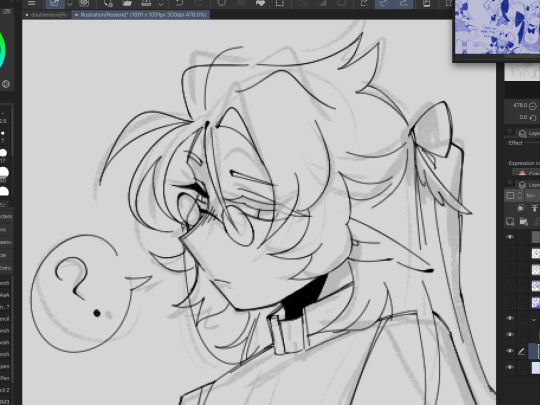
[WIP] google how do i ask my librarian if hes a fa-
#guys im going insane#anyways have a little smilk as a treat while i keep drawing#this is in fact. the double amnesia smilk design in progress#as u can see im not very creative BUT i am loving his gay little glasses and i Will be drawing them often <3#maybe ill actually give this au a name hmm what do u guys think#its both sm and pv losing their memories and living that cottagecore life till responsibilities come bite them in the ass#ahh i had an idea and forgot..#give me some ideas#my drawbs#shadow milk cookie#in a different life au
632 notes
·
View notes
Text
told my dad i was writing again just to have something to get him off my case with and of course he asked what i was writing so i had to be vague about it and summarised it as "a story about two people responsible for hurting each other learning to communicate, live with and care for each other" and he was like oh is it based on our relationship?

#🐉#in what fucking universe is that a reasonable response to someone sharing their creative passions with you#thank fuck i love those characters more than him so he hasnt ruined them for me forever
461 notes
·
View notes
Text


William tries to do something for his family, having only 1 “friend” to turn to for help
[original snippet from the fanfic v]

#I took creative liberty#reading this had me in tears @ 2am#William: 🤓the only way I can convince him to do this is getting him shitfaced#absolutely reasonable response#I sure hope this doesn’t end poorly#will share link in a little bit need 2 find#resident evil#silnaarttag#albert wesker#william birkin#Annette birkin#sherry birkin#shitpost#birkin family#rebhfun#fanfic art#fanart
401 notes
·
View notes
Text







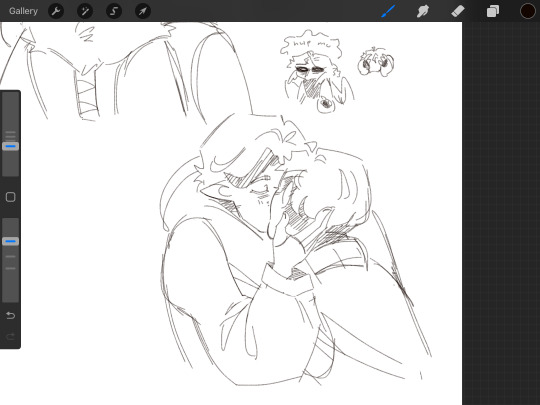

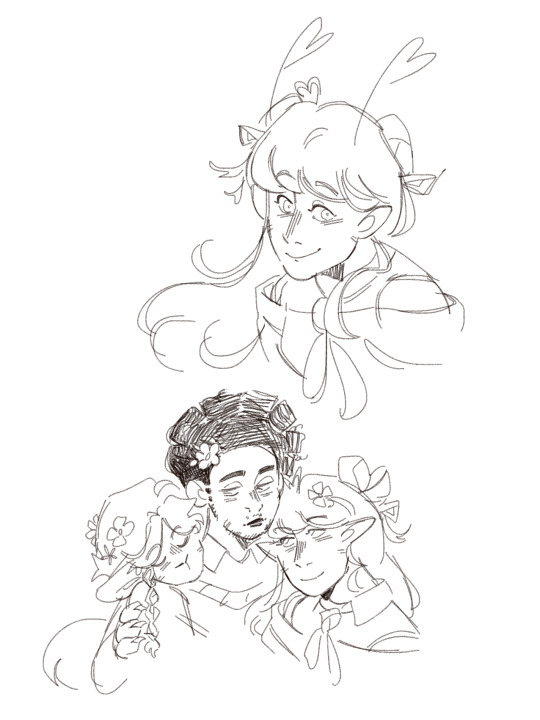
lots of misc sketches of varying quality 4 you
#dont really feel like tagging these um.#ethubs#smalletho#cledubs#jizzie#trafficshipping#the one w etho and bdubs where theyre wearing like. studded jackets was a concept/attempt at tuff guys designs#but. My only idea was. theyre ripoff bad boys. because that was my first thought when i first heard their name#didnt really feel very creative with that one asdfjgh. and i couldnt get tango to look right so i just scrapped it lol#my energy is so so low lately i need to like. See if it’s an actual health problem by now because its not good :’)#i have Responsibilities. Things to do. But no. All i have energy for is playing bad sudoku on my phone#anyway just posting these because. I can. And well. Thats lovely isnt it#sphynx sketches
194 notes
·
View notes
Note
Quick question
How do you plan your comics? Do you do storyboards or something?
Im trying to get working on one and idk where to start-
I use a mix of a few things.
Typically a sketch ideas and scenes first and then I write them down.
So that scene in Aliens and Mysteries when Raph’s talking to his brothers in bed was a storyboard-style sketch I made:

I make tons of these for both scenes that are just jokes and scenes I plan to incorporate into the story. Usually, when I have a bunch of these and other ideas swirling around in my head, I’ll start sorting them by canon importance and most structurally important, funny, or interesting. Those ones get added and arranged into the chapter list in chronological order like this:

(Note that this is not a comprehensive list of future chapters, many will be renamed, deleted, shifted and/or new ones will be added)
Then about one week to a day before I start drawing the next chapter I write it out in full detail so I don’t get lost mid chapter and know what to include. Here’s the paragraph that the above sketch turned into:

This screen-shot is from the document that contains both important information about the world and every episode in this format.
And then of course, when it comes time for the episode, it turns into this:

I think my planning style is a little…uh, fluid? It’s very common that the actual comic will deviate slightly from the written chapter. This happens most while planning out the panels; I get a bunch of new better ideas for how it should go and add them in. I usually try to keep the written chapter outlines a little on the vague-er side for that reason.
It’s also worth noting that this is the most common way I plan out stories, sometimes steps get mixed up or skipped or just spawn out of nowhere. It’s a disaster, really, but the final product is pretty good so I don’t question it 🤣
Some people prefer a much more concrete approach to writing, others prefer an even less structured approach. All depends on how your creative thrives and where on the scale of ADHD to OCD spectrum you land 😂 (joking)
This is how I do for the most part, hopefully this helps you? I wish you luck in story writing! ^v^
Good question! :]
#q&a#story stuff#writing#writing process#indie tmnt#indie’s turtles#My creative process (if you can even call it a process) is such a dumpster fire#And I wouldn’t change a thing 🤣#Honestly this is the upgraded Responsible Indie version#I wrote ROTP purely flying by the seat of my pants#Ever week I came up with the next part on the spot#I much prefer having stuff planned out just a little. Much less stressful#spoilers
84 notes
·
View notes
Note
Heavy and medic kiss? ❤️
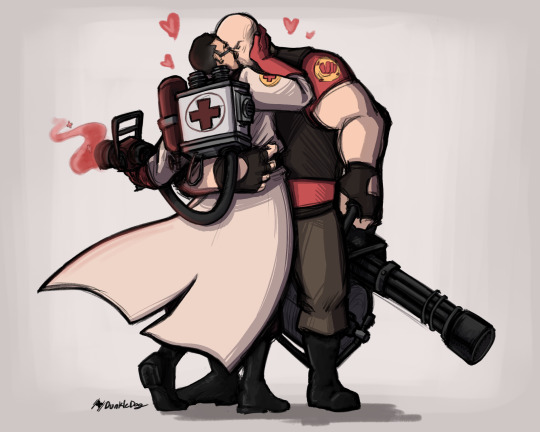
so this may or may not surprise you but i dont draw people kissing often... so here is my. best attempt? yes. here you go 👍
#response#tf2#team fortress 2#medic tf2#heavy tf2#heavymedic#red oktoberfest#when i say thumbs up emoji i mean that one image of pyro#i need to get out of my own head and just hit the post button#sasha and the medigun are not paid actors#spin off series where sasha and the medigun go on a date#valve can trust me with their creative properties nothing bad will happen if they trust me with their creative properties#heeheehoohoohoo
522 notes
·
View notes
Text
AI “art” and uncanniness
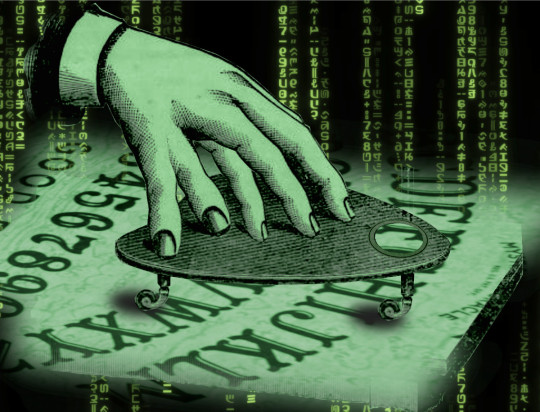
TOMORROW (May 14), I'm on a livecast about AI AND ENSHITTIFICATION with TIM O'REILLY; on TOMORROW (May 15), I'm in NORTH HOLLYWOOD for a screening of STEPHANIE KELTON'S FINDING THE MONEY; FRIDAY (May 17), I'm at the INTERNET ARCHIVE in SAN FRANCISCO to keynote the 10th anniversary of the AUTHORS ALLIANCE.

When it comes to AI art (or "art"), it's hard to find a nuanced position that respects creative workers' labor rights, free expression, copyright law's vital exceptions and limitations, and aesthetics.
I am, on balance, opposed to AI art, but there are some important caveats to that position. For starters, I think it's unequivocally wrong – as a matter of law – to say that scraping works and training a model with them infringes copyright. This isn't a moral position (I'll get to that in a second), but rather a technical one.
Break down the steps of training a model and it quickly becomes apparent why it's technically wrong to call this a copyright infringement. First, the act of making transient copies of works – even billions of works – is unequivocally fair use. Unless you think search engines and the Internet Archive shouldn't exist, then you should support scraping at scale:
https://pluralistic.net/2023/09/17/how-to-think-about-scraping/
And unless you think that Facebook should be allowed to use the law to block projects like Ad Observer, which gathers samples of paid political disinformation, then you should support scraping at scale, even when the site being scraped objects (at least sometimes):
https://pluralistic.net/2021/08/06/get-you-coming-and-going/#potemkin-research-program
After making transient copies of lots of works, the next step in AI training is to subject them to mathematical analysis. Again, this isn't a copyright violation.
Making quantitative observations about works is a longstanding, respected and important tool for criticism, analysis, archiving and new acts of creation. Measuring the steady contraction of the vocabulary in successive Agatha Christie novels turns out to offer a fascinating window into her dementia:
https://www.theguardian.com/books/2009/apr/03/agatha-christie-alzheimers-research
Programmatic analysis of scraped online speech is also critical to the burgeoning formal analyses of the language spoken by minorities, producing a vibrant account of the rigorous grammar of dialects that have long been dismissed as "slang":
https://www.researchgate.net/publication/373950278_Lexicogrammatical_Analysis_on_African-American_Vernacular_English_Spoken_by_African-Amecian_You-Tubers
Since 1988, UCL Survey of English Language has maintained its "International Corpus of English," and scholars have plumbed its depth to draw important conclusions about the wide variety of Englishes spoken around the world, especially in postcolonial English-speaking countries:
https://www.ucl.ac.uk/english-usage/projects/ice.htm
The final step in training a model is publishing the conclusions of the quantitative analysis of the temporarily copied documents as software code. Code itself is a form of expressive speech – and that expressivity is key to the fight for privacy, because the fact that code is speech limits how governments can censor software:
https://www.eff.org/deeplinks/2015/04/remembering-case-established-code-speech/
Are models infringing? Well, they certainly can be. In some cases, it's clear that models "memorized" some of the data in their training set, making the fair use, transient copy into an infringing, permanent one. That's generally considered to be the result of a programming error, and it could certainly be prevented (say, by comparing the model to the training data and removing any memorizations that appear).
Not every seeming act of memorization is a memorization, though. While specific models vary widely, the amount of data from each training item retained by the model is very small. For example, Midjourney retains about one byte of information from each image in its training data. If we're talking about a typical low-resolution web image of say, 300kb, that would be one three-hundred-thousandth (0.0000033%) of the original image.
Typically in copyright discussions, when one work contains 0.0000033% of another work, we don't even raise the question of fair use. Rather, we dismiss the use as de minimis (short for de minimis non curat lex or "The law does not concern itself with trifles"):
https://en.wikipedia.org/wiki/De_minimis
Busting someone who takes 0.0000033% of your work for copyright infringement is like swearing out a trespassing complaint against someone because the edge of their shoe touched one blade of grass on your lawn.
But some works or elements of work appear many times online. For example, the Getty Images watermark appears on millions of similar images of people standing on red carpets and runways, so a model that takes even in infinitesimal sample of each one of those works might still end up being able to produce a whole, recognizable Getty Images watermark.
The same is true for wire-service articles or other widely syndicated texts: there might be dozens or even hundreds of copies of these works in training data, resulting in the memorization of long passages from them.
This might be infringing (we're getting into some gnarly, unprecedented territory here), but again, even if it is, it wouldn't be a big hardship for model makers to post-process their models by comparing them to the training set, deleting any inadvertent memorizations. Even if the resulting model had zero memorizations, this would do nothing to alleviate the (legitimate) concerns of creative workers about the creation and use of these models.
So here's the first nuance in the AI art debate: as a technical matter, training a model isn't a copyright infringement. Creative workers who hope that they can use copyright law to prevent AI from changing the creative labor market are likely to be very disappointed in court:
https://www.hollywoodreporter.com/business/business-news/sarah-silverman-lawsuit-ai-meta-1235669403/
But copyright law isn't a fixed, eternal entity. We write new copyright laws all the time. If current copyright law doesn't prevent the creation of models, what about a future copyright law?
Well, sure, that's a possibility. The first thing to consider is the possible collateral damage of such a law. The legal space for scraping enables a wide range of scholarly, archival, organizational and critical purposes. We'd have to be very careful not to inadvertently ban, say, the scraping of a politician's campaign website, lest we enable liars to run for office and renege on their promises, while they insist that they never made those promises in the first place. We wouldn't want to abolish search engines, or stop creators from scraping their own work off sites that are going away or changing their terms of service.
Now, onto quantitative analysis: counting words and measuring pixels are not activities that you should need permission to perform, with or without a computer, even if the person whose words or pixels you're counting doesn't want you to. You should be able to look as hard as you want at the pixels in Kate Middleton's family photos, or track the rise and fall of the Oxford comma, and you shouldn't need anyone's permission to do so.
Finally, there's publishing the model. There are plenty of published mathematical analyses of large corpuses that are useful and unobjectionable. I love me a good Google n-gram:
https://books.google.com/ngrams/graph?content=fantods%2C+heebie-jeebies&year_start=1800&year_end=2019&corpus=en-2019&smoothing=3
And large language models fill all kinds of important niches, like the Human Rights Data Analysis Group's LLM-based work helping the Innocence Project New Orleans' extract data from wrongful conviction case files:
https://hrdag.org/tech-notes/large-language-models-IPNO.html
So that's nuance number two: if we decide to make a new copyright law, we'll need to be very sure that we don't accidentally crush these beneficial activities that don't undermine artistic labor markets.
This brings me to the most important point: passing a new copyright law that requires permission to train an AI won't help creative workers get paid or protect our jobs.
Getty Images pays photographers the least it can get away with. Publishers contracts have transformed by inches into miles-long, ghastly rights grabs that take everything from writers, but still shifts legal risks onto them:
https://pluralistic.net/2022/06/19/reasonable-agreement/
Publishers like the New York Times bitterly oppose their writers' unions:
https://actionnetwork.org/letters/new-york-times-stop-union-busting
These large corporations already control the copyrights to gigantic amounts of training data, and they have means, motive and opportunity to license these works for training a model in order to pay us less, and they are engaged in this activity right now:
https://www.nytimes.com/2023/12/22/technology/apple-ai-news-publishers.html
Big games studios are already acting as though there was a copyright in training data, and requiring their voice actors to begin every recording session with words to the effect of, "I hereby grant permission to train an AI with my voice" and if you don't like it, you can hit the bricks:
https://www.vice.com/en/article/5d37za/voice-actors-sign-away-rights-to-artificial-intelligence
If you're a creative worker hoping to pay your bills, it doesn't matter whether your wages are eroded by a model produced without paying your employer for the right to do so, or whether your employer got to double dip by selling your work to an AI company to train a model, and then used that model to fire you or erode your wages:
https://pluralistic.net/2023/02/09/ai-monkeys-paw/#bullied-schoolkids
Individual creative workers rarely have any bargaining leverage over the corporations that license our copyrights. That's why copyright's 40-year expansion (in duration, scope, statutory damages) has resulted in larger, more profitable entertainment companies, and lower payments – in real terms and as a share of the income generated by their work – for creative workers.
As Rebecca Giblin and I write in our book Chokepoint Capitalism, giving creative workers more rights to bargain with against giant corporations that control access to our audiences is like giving your bullied schoolkid extra lunch money – it's just a roundabout way of transferring that money to the bullies:
https://pluralistic.net/2022/08/21/what-is-chokepoint-capitalism/
There's an historical precedent for this struggle – the fight over music sampling. 40 years ago, it wasn't clear whether sampling required a copyright license, and early hip-hop artists took samples without permission, the way a horn player might drop a couple bars of a well-known song into a solo.
Many artists were rightfully furious over this. The "heritage acts" (the music industry's euphemism for "Black people") who were most sampled had been given very bad deals and had seen very little of the fortunes generated by their creative labor. Many of them were desperately poor, despite having made millions for their labels. When other musicians started making money off that work, they got mad.
In the decades that followed, the system for sampling changed, partly through court cases and partly through the commercial terms set by the Big Three labels: Sony, Warner and Universal, who control 70% of all music recordings. Today, you generally can't sample without signing up to one of the Big Three (they are reluctant to deal with indies), and that means taking their standard deal, which is very bad, and also signs away your right to control your samples.
So a musician who wants to sample has to sign the bad terms offered by a Big Three label, and then hand $500 out of their advance to one of those Big Three labels for the sample license. That $500 typically doesn't go to another artist – it goes to the label, who share it around their executives and investors. This is a system that makes every artist poorer.
But it gets worse. Putting a price on samples changes the kind of music that can be economically viable. If you wanted to clear all the samples on an album like Public Enemy's "It Takes a Nation of Millions To Hold Us Back," or the Beastie Boys' "Paul's Boutique," you'd have to sell every CD for $150, just to break even:
https://memex.craphound.com/2011/07/08/creative-license-how-the-hell-did-sampling-get-so-screwed-up-and-what-the-hell-do-we-do-about-it/
Sampling licenses don't just make every artist financially worse off, they also prevent the creation of music of the sort that millions of people enjoy. But it gets even worse. Some older, sample-heavy music can't be cleared. Most of De La Soul's catalog wasn't available for 15 years, and even though some of their seminal music came back in March 2022, the band's frontman Trugoy the Dove didn't live to see it – he died in February 2022:
https://www.vulture.com/2023/02/de-la-soul-trugoy-the-dove-dead-at-54.html
This is the third nuance: even if we can craft a model-banning copyright system that doesn't catch a lot of dolphins in its tuna net, it could still make artists poorer off.
Back when sampling started, it wasn't clear whether it would ever be considered artistically important. Early sampling was crude and experimental. Musicians who trained for years to master an instrument were dismissive of the idea that clicking a mouse was "making music." Today, most of us don't question the idea that sampling can produce meaningful art – even musicians who believe in licensing samples.
Having lived through that era, I'm prepared to believe that maybe I'll look back on AI "art" and say, "damn, I can't believe I never thought that could be real art."
But I wouldn't give odds on it.
I don't like AI art. I find it anodyne, boring. As Henry Farrell writes, it's uncanny, and not in a good way:
https://www.programmablemutter.com/p/large-language-models-are-uncanny
Farrell likens the work produced by AIs to the movement of a Ouija board's planchette, something that "seems to have a life of its own, even though its motion is a collective side-effect of the motions of the people whose fingers lightly rest on top of it." This is "spooky-action-at-a-close-up," transforming "collective inputs … into apparently quite specific outputs that are not the intended creation of any conscious mind."
Look, art is irrational in the sense that it speaks to us at some non-rational, or sub-rational level. Caring about the tribulations of imaginary people or being fascinated by pictures of things that don't exist (or that aren't even recognizable) doesn't make any sense. There's a way in which all art is like an optical illusion for our cognition, an imaginary thing that captures us the way a real thing might.
But art is amazing. Making art and experiencing art makes us feel big, numinous, irreducible emotions. Making art keeps me sane. Experiencing art is a precondition for all the joy in my life. Having spent most of my life as a working artist, I've come to the conclusion that the reason for this is that art transmits an approximation of some big, numinous irreducible emotion from an artist's mind to our own. That's it: that's why art is amazing.
AI doesn't have a mind. It doesn't have an intention. The aesthetic choices made by AI aren't choices, they're averages. As Farrell writes, "LLM art sometimes seems to communicate a message, as art does, but it is unclear where that message comes from, or what it means. If it has any meaning at all, it is a meaning that does not stem from organizing intention" (emphasis mine).
Farrell cites Mark Fisher's The Weird and the Eerie, which defines "weird" in easy to understand terms ("that which does not belong") but really grapples with "eerie."
For Fisher, eeriness is "when there is something present where there should be nothing, or is there is nothing present when there should be something." AI art produces the seeming of intention without intending anything. It appears to be an agent, but it has no agency. It's eerie.
Fisher talks about capitalism as eerie. Capital is "conjured out of nothing" but "exerts more influence than any allegedly substantial entity." The "invisible hand" shapes our lives more than any person. The invisible hand is fucking eerie. Capitalism is a system in which insubstantial non-things – corporations – appear to act with intention, often at odds with the intentions of the human beings carrying out those actions.
So will AI art ever be art? I don't know. There's a long tradition of using random or irrational or impersonal inputs as the starting point for human acts of artistic creativity. Think of divination:
https://pluralistic.net/2022/07/31/divination/
Or Brian Eno's Oblique Strategies:
http://stoney.sb.org/eno/oblique.html
I love making my little collages for this blog, though I wouldn't call them important art. Nevertheless, piecing together bits of other peoples' work can make fantastic, important work of historical note:
https://www.johnheartfield.com/John-Heartfield-Exhibition/john-heartfield-art/famous-anti-fascist-art/heartfield-posters-aiz
Even though painstakingly cutting out tiny elements from others' images can be a meditative and educational experience, I don't think that using tiny scissors or the lasso tool is what defines the "art" in collage. If you can automate some of this process, it could still be art.
Here's what I do know. Creating an individual bargainable copyright over training will not improve the material conditions of artists' lives – all it will do is change the relative shares of the value we create, shifting some of that value from tech companies that hate us and want us to starve to entertainment companies that hate us and want us to starve.
As an artist, I'm foursquare against anything that stands in the way of making art. As an artistic worker, I'm entirely committed to things that help workers get a fair share of the money their work creates, feed their families and pay their rent.
I think today's AI art is bad, and I think tomorrow's AI art will probably be bad, but even if you disagree (with either proposition), I hope you'll agree that we should be focused on making sure art is legal to make and that artists get paid for it.
Just because copyright won't fix the creative labor market, it doesn't follow that nothing will. If we're worried about labor issues, we can look to labor law to improve our conditions. That's what the Hollywood writers did, in their groundbreaking 2023 strike:
https://pluralistic.net/2023/10/01/how-the-writers-guild-sunk-ais-ship/
Now, the writers had an advantage: they are able to engage in "sectoral bargaining," where a union bargains with all the major employers at once. That's illegal in nearly every other kind of labor market. But if we're willing to entertain the possibility of getting a new copyright law passed (that won't make artists better off), why not the possibility of passing a new labor law (that will)? Sure, our bosses won't lobby alongside of us for more labor protection, the way they would for more copyright (think for a moment about what that says about who benefits from copyright versus labor law expansion).
But all workers benefit from expanded labor protection. Rather than going to Congress alongside our bosses from the studios and labels and publishers to demand more copyright, we could go to Congress alongside every kind of worker, from fast-food cashiers to publishing assistants to truck drivers to demand the right to sectoral bargaining. That's a hell of a coalition.
And if we do want to tinker with copyright to change the way training works, let's look at collective licensing, which can't be bargained away, rather than individual rights that can be confiscated at the entrance to our publisher, label or studio's offices. These collective licenses have been a huge success in protecting creative workers:
https://pluralistic.net/2023/02/26/united-we-stand/
Then there's copyright's wildest wild card: The US Copyright Office has repeatedly stated that works made by AIs aren't eligible for copyright, which is the exclusive purview of works of human authorship. This has been affirmed by courts:
https://pluralistic.net/2023/08/20/everything-made-by-an-ai-is-in-the-public-domain/
Neither AI companies nor entertainment companies will pay creative workers if they don't have to. But for any company contemplating selling an AI-generated work, the fact that it is born in the public domain presents a substantial hurdle, because anyone else is free to take that work and sell it or give it away.
Whether or not AI "art" will ever be good art isn't what our bosses are thinking about when they pay for AI licenses: rather, they are calculating that they have so much market power that they can sell whatever slop the AI makes, and pay less for the AI license than they would make for a human artist's work. As is the case in every industry, AI can't do an artist's job, but an AI salesman can convince an artist's boss to fire the creative worker and replace them with AI:
https://pluralistic.net/2024/01/29/pay-no-attention/#to-the-little-man-behind-the-curtain
They don't care if it's slop – they just care about their bottom line. A studio executive who cancels a widely anticipated film prior to its release to get a tax-credit isn't thinking about artistic integrity. They care about one thing: money. The fact that AI works can be freely copied, sold or given away may not mean much to a creative worker who actually makes their own art, but I assure you, it's the only thing that matters to our bosses.

If you'd like an essay-formatted version of this post to read or share, here's a link to it on pluralistic.net, my surveillance-free, ad-free, tracker-free blog:
https://pluralistic.net/2024/05/13/spooky-action-at-a-close-up/#invisible-hand
#pluralistic#ai art#eerie#ai#weird#henry farrell#copyright#copyfight#creative labor markets#what is art#ideomotor response#mark fisher#invisible hand#uncanniness#prompting
273 notes
·
View notes
Text
#I personally think it just sort of happened#like the other sides might have influenced it but I doubt anybody intentionally wanted him to basically die#Honestly if anyone was going to have killed the original creativity than I think it would be Virgil#I think he split him as a response to him doing something Virgil thought was bad and Instincts kicked in and Virgil chose Fight.#but thats only if you think a 7-11 year old killed someone#which I don't#roman sanders#remus sanders#patton sanders#virgil sanders#king creativity#sanders sides
93 notes
·
View notes
Text
Dialogue Response
"I want to kiss you."
"Then do it."
"Oh, I can tell."
"Here? Right now?"
"I want to kiss you too."
"What are you waiting for?"
"Then ask me nicely for a kiss."
"And yet you are still not doing it."
"I feel like you want to do more than that."
"Do you want me to bend down, so you can?"
"That's too bad, because it's not going to happen."
All the Dialogue Responses can be found here.
If you like my blog and want to support me, you can buy me a coffee or become a member! 🥰
4K notes
·
View notes
Text
Jason, in a Mood(TM): God, I hate fucking bees.
Leo, not helping: Then stop fucking bees, Jason!
Jason: Leo, I'm gonna break your arms.
#i think their communication would consist of a lot of creative but empty threats in response to#mild annoyance#jason grace#leo valdez#valgrace#heroes of olympus#heroes of olympus incorrect quotes#hoo incorrect quotes
192 notes
·
View notes
Text
ship and let ship but some of you people deserve federal for the crime of getting on my nerves. and for that, i am sending your little ship to the stocks.
#personal#to be clear this is response to discourse around a film i have never once even read fic for but#many such cases i fear#in what WORLD does nagging someone into ANYTHING create genuine enthusiasm creativity and joy#anyways fandom is what you make it and i will keep curating my experiences but i had to have one (1) lapse into bitchery
38 notes
·
View notes
Text
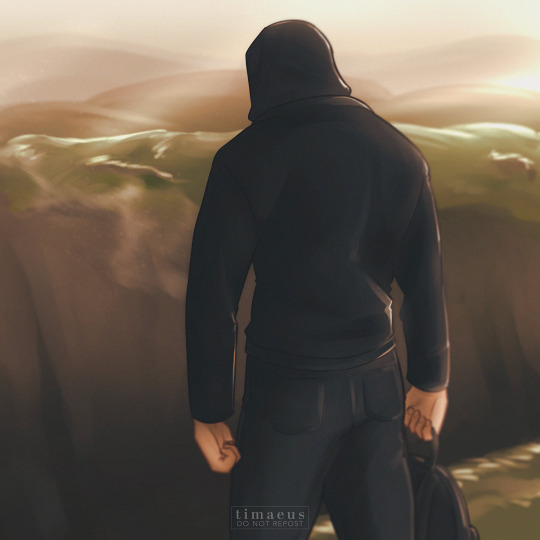
"as we were dancing in the blue, i was synchronized with you. but now the sound of love is out of tune." - I Love You | Woodkid
#never gonna let activision live after i catch the one RESPONSIBLE FOR THIS “CREATIVE” DECISION#RICKY WHEN I CATCH U RICKY!!! RICKY WHEN I CATCH U!!!!#mwiii spoilers#mw3 spoilers#my art#2023#call of duty#call of duty: modern warfare#call of duty: modern warfare ii#call of duty: modern warfare iii#cod#codmw#modern warfare#mw#mw2#mw3#ghost#soap#ghostsoap#soapghost#ghoap#art#fanart#simon riley#simon ghost riley#ghost cod#soap mactavish#johnny soap mactavish#soap cod#digital art
568 notes
·
View notes